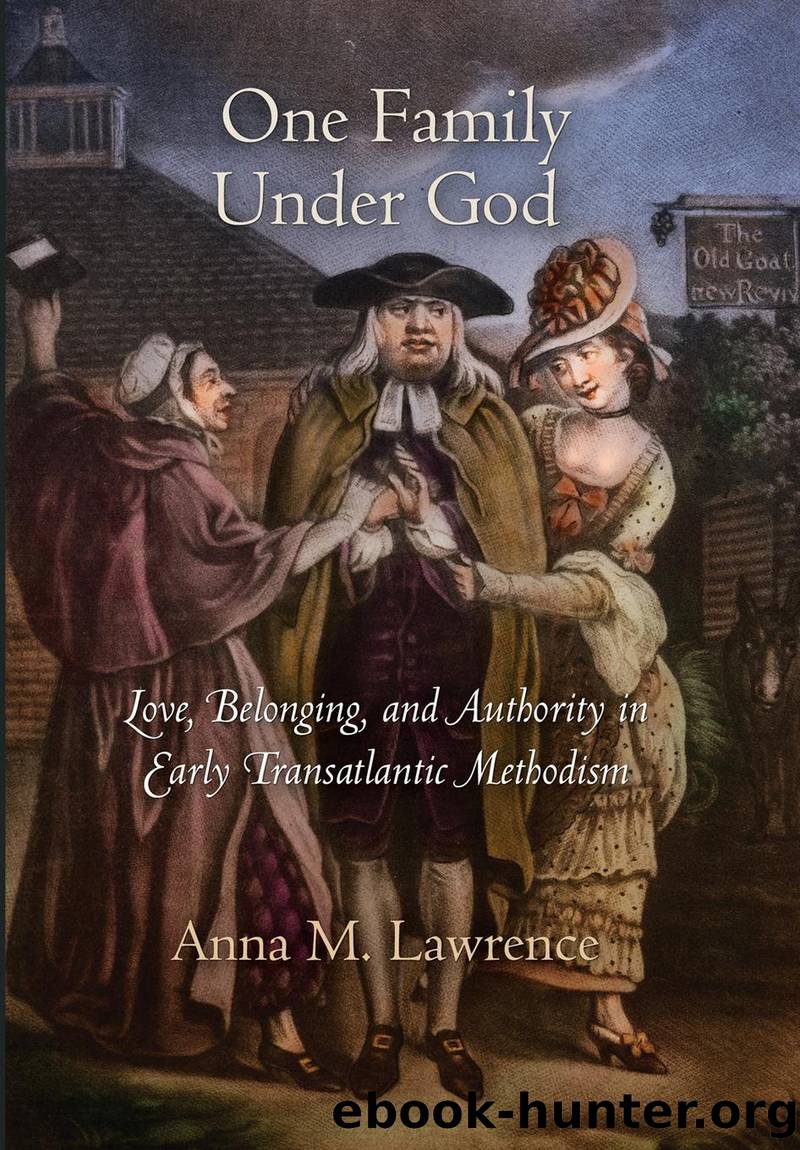One Family under God by Lawrence Anna M.;

Author:Lawrence, Anna M.;
Language: eng
Format: epub
Publisher: University of Pennsylvania Press
Published: 2019-08-15T00:00:00+00:00
Chapter 6
âThe Whole World Is Composed of Familiesâ
Eighteenth-century popular literature characterized Methodists as being home wreckers or antifamily, at least in the conventional sense.1 One reason for this association was the way that converts left behind their familiesâ traditions and committed themselves to a new religious family. When it came to the decision of marriage, converts tended to further diminish parental authority by relying upon their own interpretations of divine authority and seeking advice from others in the Methodist family. Rather than give primacy to the nuclear family unit, early Methodists more commonly counseled individuals to resist pressures from oppositional parents or friends.
Evangelicals questioned the purpose of marriage and family formation in the context of designing their ideal socioreligious order. Despite the numerous Methodist arguments against marriage, many eighteenth-century evangelicals married and made their own families. Even as individual families became more prevalent within the larger Methodist family, late eighteenth-century Methodists continued to describe marriage as a deliberative quandary. It was not easy for many prominent Methodists to make this decision, since many saw it as compromising their religious goals. Nevertheless, some Methodists mounted a counterargument to the holy calling of celibacy by asserting that marriage brought them to higher levels of religiosity. By the end of the eighteenth century, there was a growing practical necessity for thinking further about evangelical families as a whole. While early Methodism had been focused on the individual convert, the challenge for maturing Methodist societies was how to mesh individual Methodist families into the wider Methodist connection.
Throughout the eighteenth century, Anglican and Presbyterian ministers promoted family prayer as a practice in various pamphlets and books. These works decried a declension in family-centered worship, beginning in the 1730s through the 1760s, during the rise of evangelical revivalism in England and America.2 Many of these works called upon family patriarchs to bring order to disordered, religiously splintered, or disaffected households. In the evangelical context, though, the disaffected family, who only nominally belonged to a traditional church, was exactly the opening that evangelicals hoped to breach, drawing individuals away from their traditional religious practices.
As a contrast to the Anglican literature on family worship in the eighteenth century, no eighteenth-century pamphlets were directed at Methodist families, instructing fathers, mothers, and children on proper relationships and religious practice. Instead, Methodists gave the responsibility of addressing family worship to the preachers. In the late eighteenth century, preachers were at the forefront of the movement to acknowledge the centrality of families to Methodist growth. Preachers repeatedly described leading family prayers when staying in American and British Methodist households on their circuits. In 1780, American Methodist leaders instructed preachers to make a concerted effort to use their position as lodgers within evangelical families as an opportunity to increase family spirituality by speaking to individual family members and praying with them. In 1784, the American Methodist Discipline marked American Methodismâs first foray into converting whole families instead of individual souls by making âfamily religionâ a priority. In 1798, the Methodist Discipline called for preachers to pay particular attention to families: â[t]he whole world is composed of families.
Download
This site does not store any files on its server. We only index and link to content provided by other sites. Please contact the content providers to delete copyright contents if any and email us, we'll remove relevant links or contents immediately.
| Baptist | Book of Common Prayer |
| Calvinist | Episcopalian |
| Inspirational | Lutheran |
| Methodist | Pentecostal & Charismatic |
| Presbyterian | Quaker |
| Seventh-Day Adventist | Shaker |
| Theology |
Fangirl by Rainbow Rowell(8786)
How to Bang a Billionaire by Alexis Hall(7931)
Wonder by R. J. Palacio(7742)
The Space Between by Michelle L. Teichman(6575)
The Thirst by Nesbo Jo(6437)
Assassin’s Fate by Robin Hobb(5855)
Wiseguy by Nicholas Pileggi(5316)
The Night Circus by Erin Morgenstern(5037)
The Kite Runner by Khaled Hosseini(4952)
Paper Towns by Green John(4797)
Bittersweet (True North #1) by Sarina Bowen(4715)
Gerald's Game by Stephen King(4374)
Too Much and Not the Mood by Durga Chew-Bose(4091)
Pillow Thoughts by Courtney Peppernell(4011)
Goodbye Paradise(3446)
Twelve Days of Christmas by Debbie Macomber(3412)
Good by S. Walden(3346)
The Rosie Effect by Graeme Simsion(3207)
The Cellar by Natasha Preston(3077)
